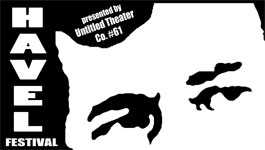|
Essay : The Art of Václav Havel By William Niederkorn In light of the achievements of Václav Havel as a dissident who became the president of his country, and who wrote serious declarations and open letters and addresses, it may be hard to imagine that first and foremost, he is a playwright and that his plays are, first and foremost, works of art. That is to say, his plays are not political tracts. They are primarily very subtly crafted meditations on particular problems that, through his art, become universal problems. If a Havel play is performed and directed as it should be, then, no matter what their political views, all audience members should be able to appreciate the artistic quality of the work. I have noticed in talking with friends about the festival that there is great enthusiasm about something they experienced in the audience for Havel’s plays no matter what their political inclinations might be. For that reason anyone who is directing one of Havel’s plays in the festival, or at any time, would be very much mistaken to stage it, for instance, as a conflict between good guys and bad guys, or to impose any political presupposition upon it. The main characters are not one-dimensional but are more like real human beings with real human problems that they are trying to work out. So actors—along with directors, designers, and all those who contribute to the realization of a Havel play on stage—have to work through the text to discover the artistic qualities that Havel has put there. What is then exciting about a play by Havel is much like what is exciting about a play by Chekhov or Ibsen or Shakespeare. Havel has written plays that have to be performed to be understood in the context of the communal experience that audiences have in the theater. It is important to let the changes work, line by line, in order for the comedy, tragedy, irony or romance of the action to emerge. What is so impressive about Havel, even in his role in the real world, as dissident and as president, is that he has a fine sense of ambiguity. When he became president, he did not allow a list of enemies to be created. He was not going to put himself in the position of imitating the leaders that had been overthrown. As a dissident, he had empathy for the people who were consigned to playing the roles of the police who had to follow him around, living in their cars for long shifts at a time or squatting in his hallway. He would do what he could to make them comfortable, like bringing them hot tea on cold nights, so that they could only realize that he understood them as human beings stuck in a situation, too. There is a vast humanism about Havel, and if it could have been different, if he hadn’t been a citizen of a country with a botched-up political system imposed from outside that was afflicting everyone in the society, what might he have been able to achieve in the theater that would have elevated him even further as an artist of true comedy and drama with a subtle sense of the absurd in modern life? In his “Letters to Olga,” written when he was imprisoned for over three years, doing forced labor, you can feel his passion for the artist’s life that he was cut off from—his wish to have the time to make art out of the inspirations that naturally were coming to him. |
||||||||||
Sponsored by:
 |
 |
 |
